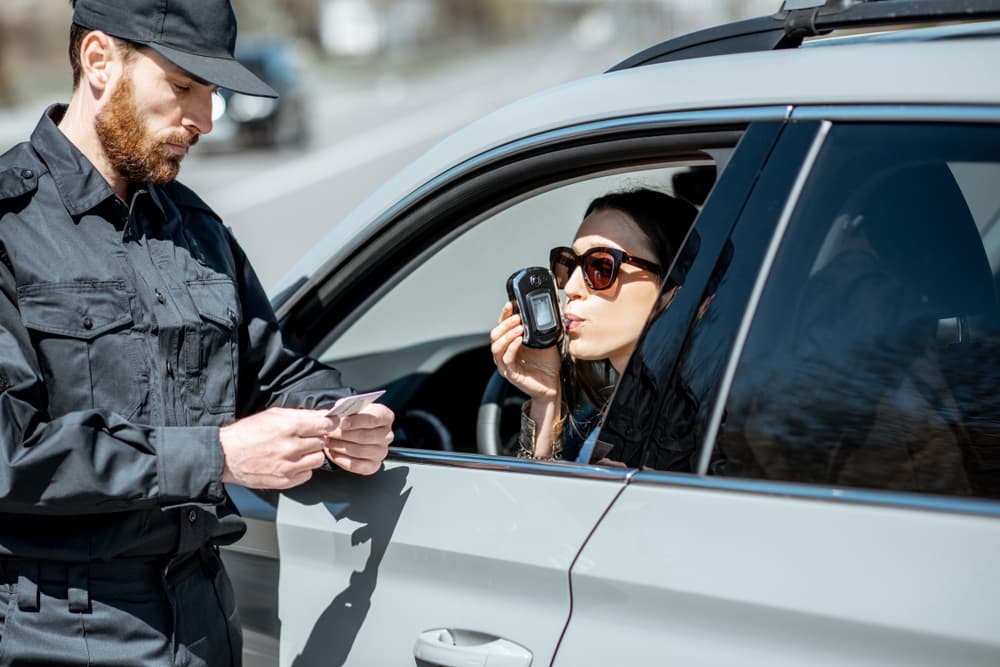DUI/OVI checkpoints are a common tool law enforcement agencies use to monitor road safety. However, many drivers in Ohio don’t know about the legality of checkpoints and their related rights. In this blog, we clarify and understand the legality of DUI checkpoints in Ohio. Contact DUI defense lawyer in Ohio for further legal guidance.
What Is a DUI Checkpoint?
DUI checkpoints, also known as sobriety checkpoints or OVI checkpoints in Ohio, are roadblocks set up by law enforcement to check for impaired drivers. These checkpoints are typically temporary and are often established during times when impaired driving is more likely, such as weekends or holidays. The primary goal is to deter drunk driving and enhance road safety.
Legal Status of DUI Checkpoints in Ohio

The legality of DUI checkpoints in Ohio is grounded in both state and federal judicial decisions. The U.S. Supreme Court, in the landmark case of Michigan v. Sitz (1990), determined that the benefits of sobriety checkpoints in deterring drunk driving outweigh the minimal intrusion on individual privacy.
This ruling permits DUI checkpoints under the U.S. Constitution by balancing the state’s interest in preventing drunk driving against the level of intrusion on individual drivers who the police briefly stop.
In Ohio, the Supreme Court has also affirmed the legality of DUI checkpoints, stipulating certain conditions to ensure they comply with constitutional standards.
These conditions, as outlined by the Ohio State Highway Patrol in Policy Number OSP-200.21, include:
- Selection of Checkpoint Location: The site must be chosen based on a significant history of alcohol-related crashes and impaired driving violations. It should also consider the safety of motorists and officers.
- Advance Planning: The operation of these checkpoints requires careful planning, including deciding where and when they will be conducted.
- Pattern of Vehicle Stops: Law enforcement must follow an established pattern, such as stopping every third car, which must be predetermined.
- Public Notice: Information about upcoming checkpoints must be publicized in advance, typically through local media, to inform the public.
- Management of the Checkpoint: The checkpoint must be safe and visible and allow vehicles to exit if they choose not to enter. Officers’ discretion in conducting stops is limited, and enough officers must be present to confirm it as an official police roadblock.
- Screening Process: Officers greet drivers and screen for signs of impairment. However, they may not progress to further detention and investigation without individualized suspicion of criminal activity based on the facts.
- Rights at Checkpoints: Despite being stopped at a checkpoint, drivers still retain certain rights, such as the right to remain silent and avoid unreasonable searches. Defendants can challenge the admissibility of any evidence they police obtained in violation of these rights.
Failure to adhere to these guidelines can call into question the legality of the checkpoint and may lead to the suppression of evidence obtained during the stop.
These regulations ensure that while DUI checkpoints may infringe upon certain constitutional protections, authorities conduct them in a manner that balances public safety with individual rights. Any deviations from these standards can provide grounds for legal challenges.
What Happens at a DUI Checkpoint?
During a DUI checkpoint in Ohio, drivers should expect the following:
Brief Stop
When you approach a DUI checkpoint in Ohio, the first thing to expect is a brief stop. This is a temporary pause where law enforcement officers conduct a preliminary assessment. These stops are generally quick, provided there are no signs of legal concerns.
A brief stop can maintain traffic flow while allowing officers to perform their duties effectively. During this time, drivers should remain calm and cooperative. Showing respect and understanding towards the officers conducting the checkpoint can make this process smoother for everyone involved.
Document Verification
After the initial stop, officers will likely ask for your driver’s license, vehicle registration, and proof of insurance. This step helps officers verify that you are legally authorized to drive and that your vehicle is properly registered and insured. Having these documents readily available can expedite the process. It’s a good idea to keep these documents in an easily accessible place in your vehicle to avoid any unnecessary delay.
This verification is a standard procedure at DUI checkpoints and helps ensure that all drivers on the road are compliant with state vehicle regulations.
Questioning and Tests
During a DUI checkpoint, officers may ask questions about your recent activities. Authorities use these questions to assess whether there might be any reason to suspect impairment.
For example, they might ask where you are coming from or if you have consumed any alcoholic beverages. While you have the right to remain silent, being polite and cooperative can often facilitate a smoother interaction.
Officers may request that you undergo field sobriety tests or a Breathalyzer test if there is suspicion of impairment. Field sobriety tests can include tasks like walking in a straight line or standing on one leg, designed to assess your physical coordination and condition. A Breathalyzer test measures your blood alcohol content (BAC). Driving with a BAC of 0.08 percent or higher in Ohio is illegal.
Due to Ohio’s implied consent laws, refusal to take these tests can have legal consequences, such as immediate license suspension. However, it’s also your right to refuse these tests if you choose to do so. If you find yourself in a situation where you are unsure of what to do, it may be wise to consult with a legal professional for guidance.
Your Rights at a Checkpoint
It’s important to understand your rights at these checkpoints:
Right to Remain Silent
The right to remain silent is a fundamental protection afforded to everyone, including those stopped at DUI checkpoints in Ohio. This right is rooted in the Fifth Amendment of the U.S. Constitution, which guards against self-incrimination.
When stopped at a checkpoint, you are not required to answer questions that can potentially incriminate you, such as whether you have been drinking.
Exercising this right should be done respectfully and politely; you can simply inform the officer that you choose not to answer specific questions. However, while you have the right to remain silent, officers may still observe and act based on visible signs of impairment or other evidence.
Refusal of Tests

In Ohio, you can refuse field sobriety and Breathalyzer tests at a DUI checkpoint. However, it’s important to understand the implications of such refusal under Ohio’s implied consent laws.
When you obtain a driver’s license in Ohio, you implicitly agree to submit to these tests if the police suspect you are driving under the influence. Therefore, refusing a sobriety test can lead to immediate administrative penalties, such as license suspension.
This is separate from any criminal charges that prosecutors may bring against you for a DUI. The duration of the suspension and other consequences can vary, typically increasing with subsequent refusals or DUI offenses.
Right to Legal Representation
If you are arrested at a DUI checkpoint, you have the right to legal representation. This right is essential to criminal justice, ensuring your legal interests are protected.
Upon arrest, you can request an attorney, and it’s advisable to do so before answering any further questions or participating in any tests. An attorney can provide guidance on your rights, navigate the legal system, and work towards the best possible outcome in your case. If you cannot afford an attorney, you are entitled to have one appointed.
Guidelines for DUI Checkpoints
Law enforcement agencies must follow certain guidelines while conducting these checkpoints:
Public Notice
In Ohio, the law requires that the public be notified in advance about the time and location of DUI checkpoints. Authorities generally give notice at least a week before they establish a checkpoint. The notification includes the checkpoint’s general date, time, and location, though not necessarily the exact location.
This requirement for public notice ostensibly informs residents and acts as a deterrent for impaired driving. local news outlets or police departments’ social media channels can announce these checkpoints. The specific details, such as the exact location and duration, are typically disclosed a few hours before the checkpoint starts operating.
Non-Discriminatory
Ohio law stipulates that police must conduct DUI checkpoints in a non-discriminatory manner. This means that vehicles must be stopped according to a predetermined formula or pattern, such as every third or fifth car, to prevent any profiling or biased selection of vehicles. This approach ensures fairness and objectivity in the operation of DUI checkpoints.
The purpose of this rule is to avoid any arbitrary or discriminatory practices in stopping vehicles and to ensure that all drivers are treated equally under the law. By adhering to a set pattern, law enforcement officers can maintain the checkpoint’s legality and effectiveness while respecting the rights of all motorists.
Stay Calm and Cooperative
Keeping a calm and cooperative demeanor during a DUI checkpoint is helpful for a smooth interaction with law enforcement. Being stopped, especially unexpectedly, can make you stressed, but remember that these checkpoints are standard procedures to ensure public safety. Staying calm helps you think clearly and communicate effectively.
When interacting with officers, be polite and respectful. This does not mean you have to waive your rights, but assert them respectfully. Cooperation also involves complying with basic requests such as stopping your vehicle at the checkpoint and showing your driver’s license when asked.
Remember, exhibiting a calm and cooperative attitude can often lead to a quicker and less stressful experience at the checkpoint.
Have Documents Ready
Having your driving-related documents readily accessible is key to smoothly navigating a DUI checkpoint. This includes your driver’s license, vehicle registration, and proof of insurance.
Law enforcement officers typically request these documents to verify your identity, the legality of your driving, and your vehicle’s registration status.
Keeping these documents in a specific, easily accessible place in your vehicle, such as the glove compartment or a dedicated holder, can help you promptly present them when asked. This preparedness demonstrates your compliance and helps expedite the checkpoint process, allowing you to proceed with minimal delay.
Understand Your Choices
When you’re at a DUI checkpoint, understand your choices, especially regarding field sobriety and Breathalyzer tests. In Ohio, as in many states, you can refuse these tests. However, you need to know the potential consequences of refusal due to Ohio’s implied consent law.
By holding an Ohio driver’s license, you consent to such tests if suspected of DUI. Refusal can lead to immediate administrative penalties, like license suspension, which is separate from any criminal charges that might follow an arrest for DUI.
Understanding these implications allows you to make an educated decision. If you refuse a test and face legal consequences, seek a legal representative.
Defenses Available for DUI in Ohio
In Ohio, if you’re facing a DUI (referred to as OVI in Ohio, which stands for Operating a Vehicle Under the Influence) charge, several potential defenses may be available.
These defenses are based on various aspects of the legal process, the accuracy of tests conducted, and the conduct of law enforcement officers.
- Failure to Read Miranda Rights After OVI Arrest: If you were not read your Miranda rights before being interrogated after an arrest, any self-incriminating statements you made may be inadmissible in court.
- Unlawful Stop by Law Enforcement Officers: For a traffic stop to be legal, officers must have probable cause or reasonable suspicion of impairment or a traffic offense. You can use this defense if the police stopped you without just cause.
- Driver Did Not Have Actual Physical Control of Vehicle: In Ohio, you don’t necessarily have to be driving to be charged with OVI. However, if you were not in physical control of the vehicle (for instance, sitting in the passenger seat or not having the keys in the ignition), this might be a defense.
- Demonstrating the Necessity Defense: This defense may be relevant in situations where you were forced to drive under duress, such as in a medical emergency.
- Weaknesses in Blood, Breath, or Urine Testing and Field Sobriety Tests: Errors in administering field sobriety tests, improperly calibrated machinery, contamination of samples, and improper documentation can all be grounds for challenging the accuracy and admissibility of test results.
Each DUI/OVI case is unique, and the application of these defenses will depend on the specifics of your situation. Consult with a skilled attorney who can assess your case and advise on the best defense strategy.
Contact an Ohio Criminal Defense Lawyer

DUI checkpoints in Ohio are a legal measure used to enhance road safety. As a driver, it’s important to understand your rights and responsibilities when approaching these checkpoints.
Remember, staying informed and calm can significantly affect your experience at these checkpoints. If you have any legal concerns or face charges related to a DUI checkpoint, consult a criminal defense attorney to guide you through the process.


